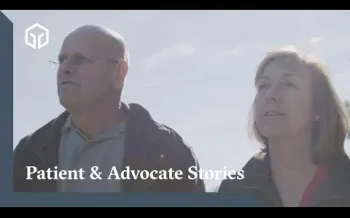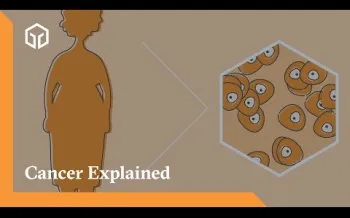Understanding your tumor’s DNA may inform the treatment options available to you. Learn more in the video.

Start With Step One to be informed
When making treatment decisions, knowledge is power
An advanced cancer diagnosis can change your life. You and your loved ones may feel overwhelmed with questions.
If you don’t know where to start when thinking about treatment options, there’s something you can do. Start With Step One—ask your doctor about the Foundation Medicine testing options, including the FoundationOne®CDx and FoundationOne®Liquid CDx tests.
Foundation Medicine tests use comprehensive genomic profiling, also known as CGP, to find information in your tumor’s DNA that may help your doctor identify a personalized cancer treatment plan that is right for you.
A personalized advanced cancer treatment plan can give you more control
Scientists and researchers, dedicated to transforming cancer care, have learned more about cancer in the past 20 years than at any other point in history.1
One discovery is the difference that understanding your tumor’s DNA can make when creating a treatment plan. This information, known as genomic information, has led to the development of treatments based on a patient’s cancer DNA, as well as the development of tests that can identify the associated treatment options that may work best based on mutations in a patient’s cancer DNA.
Foundation Medicine tests provide genomic information based on your tumor’s DNA to help you and your doctor create a treatment plan that’s right for you.
A personalized cancer treatment plan matters.

Meet Ed Russ, diagnosed with Stage 4 colon cancer. Watch as he and his wife, Sandy, explain how his test results impacted his treatment plan.*
*Metastatic colorectal cancer (mCRC) is a complex disease, and mCRC patients have a 14% survival rate five years after their diagnosis.2 43% of mCRC patients are matched to an on-label therapy, but a match does not guarantee that the treatment is right for a patient or that a patient will achieve a similar outcome.3 Speak with your doctor for more information.
Stay connected. Stay informed.
Advanced cancer can come with many unknowns. Foundation Medicine is committed to keeping you and your loved ones informed, educated, and empowered. Sign up to receive email updates from us.
- American Cancer Society. https://www.cancer.org/cancer/cancer-basics/history-of-cancer.htmlAmerican
- Cancer Society. Cancer Facts & Figures 2021. Atlanta, Ga: American Cancer Society; 2021.
- Data on File.
Other important information about Foundation Medicine testing options
Intended Use Statement
For prescription use only. FoundationOne®CDx is a qualitative genomic sequencing test for advanced cancer patients with solid tumors and analyzes 324 genes. It is intended to help doctors identify which patients may benefit from treatment with certain therapies or through clinical trials. Use of the test does not guarantee that a patient will be matched to a treatment or that all relevant genomic alterations will be detected. Some patients may require a biopsy which poses certain risks. For the full product labeling, including indications for use and risk information, visit StartWithStepOne.com.
Other important information about FoundationOne®Liquid CDx
FoundationOne®Liquid CDx is for prescription use only and is a qualitative next-generation sequencing based in vitro diagnostic test for advanced cancer patients with solid tumors. The test analyzes 324 genes utilizing circulating cell-free DNA and is FDA-approved to report short variants in 311 genes and as a companion diagnostic to identify patients who may benefit from treatment with specific therapies (listed in Table 1 of the Intended Use) in accordance with the approved therapeutic product labeling. Additional genomic findings may be reported and are not prescriptive or conclusive for labeled use of any specific therapeutic product. Use of the test does not guarantee a patient will be matched to a treatment. A negative result does not rule out the presence of an alteration. Patients being considered for eligibility for therapy based on detection of NTRK1/2/3 and ROS1 fusions should only be tested if tissue is unavailable. Patients who are negative for companion diagnostic mutations should be reflexed to tumor tissue testing and mutation status confirmed using an FDA-approved tumor tissue test, if feasible. For the complete label, including companion diagnostic indications and complete risk information, please visit www.F1LCDxLabel.com.

